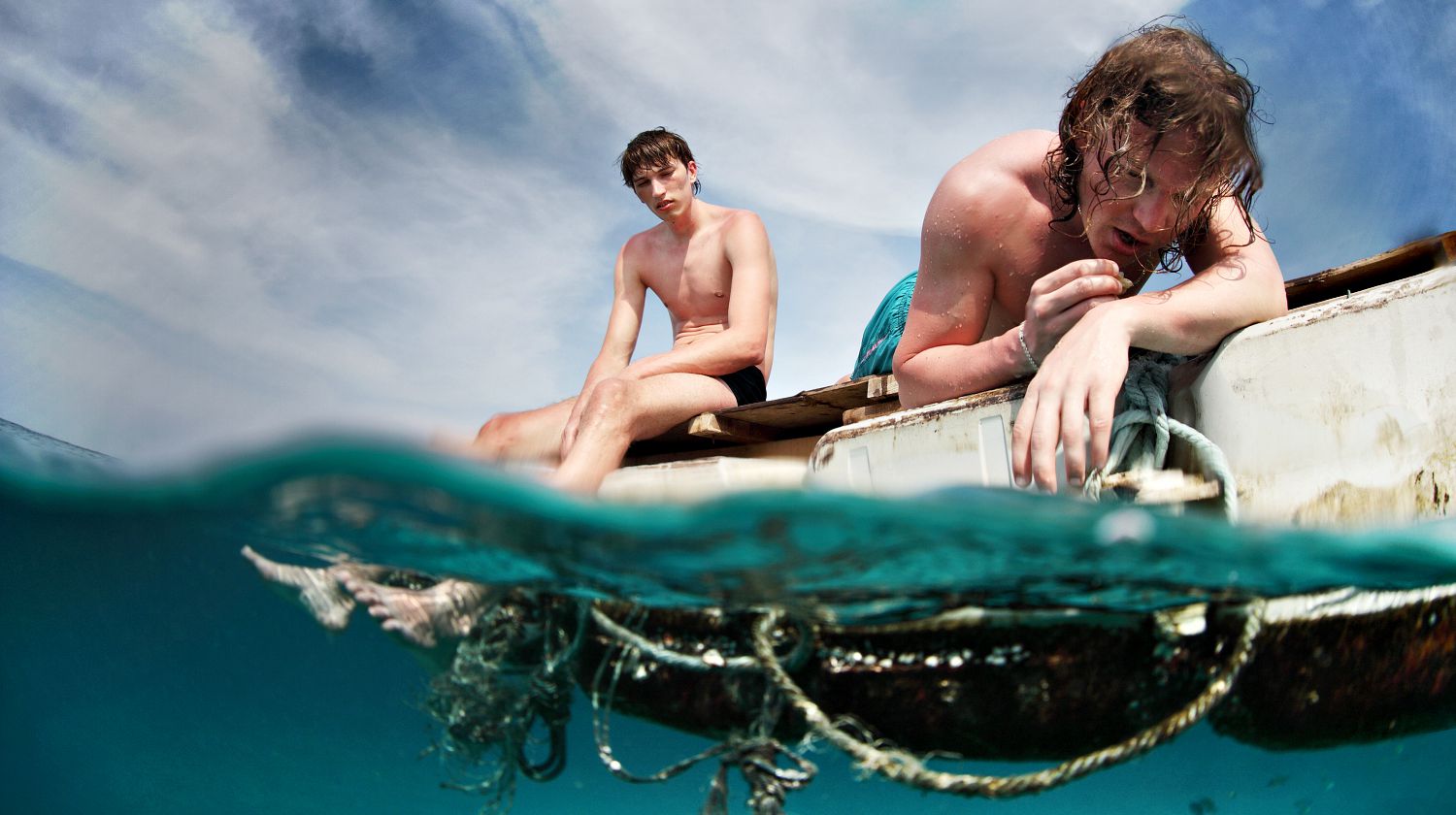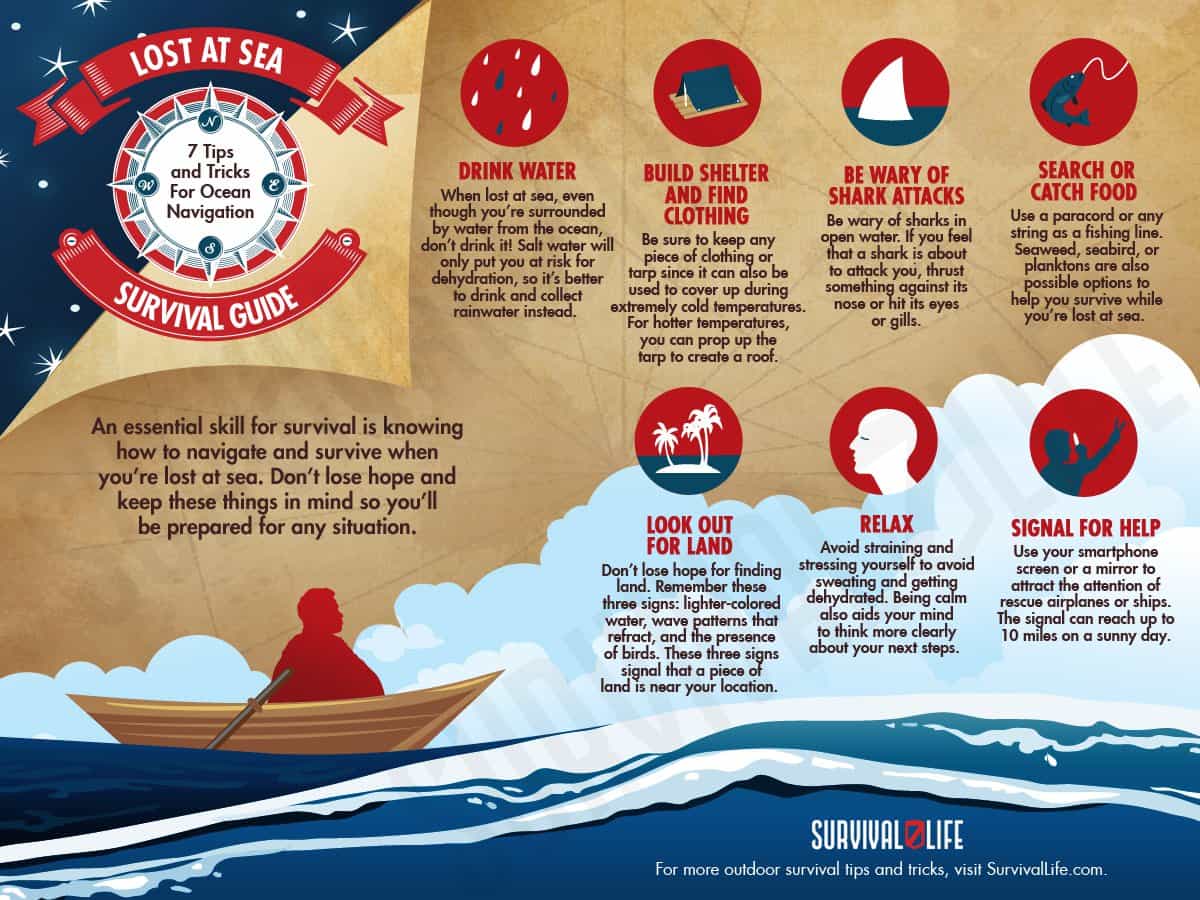Off-Grid
Lost At Sea Survival Guide | 7 Tips And Tricks For Ocean Navigation

Have you ever wondered what you’ll do if you find yourself lost at sea? Know how you can increase your chances of survival here!
RELATED: Beach Animals To Watch Out For When On Vacation
In this article:
Lost at Sea: Surviving the Unknown
Survival at Sea
Don’t you think it’s fascinating how the characters in your favorite lost at sea movie come up with strategic ways to survive using only what they’ve got? While you might think surviving at sea can only happen in the movies, it’s still a good idea to know how to survive.
Even with limited resources and unknown dangers, it is still possible to survive if you’re equipped with the proper knowledge. Read on to know the most important things to keep in mind when you find yourself lost in the waters.
1. Drink Water
One of the ironies of being stuck adrift the sea or ocean is you are surrounded by water but won’t be able to drink it.
Drinking salt water will only make you thirstier and can even make you ill. Instead, collect rainwater with any container or cloth you have with you and stock up.
2. Build Shelter and Find Clothing
|
When you are out in the open sea, finding or making a shelter can be difficult but it is still necessary. That’s why you must never throw away any clothing or tarp you have on board.
You can use clothing or a tarp to cover you up in extremely cold temperatures and prevent hypothermia. You can also use them to cover your head on hot days.
For extremely hot days or rainy days, you can even use poles or long sticks to prop up the tarp and have it serve as a roof.
3. Be Wary of Shark Attacks
|
Being out in the open water, you never know when sharks might be lurking around. While the first instinct in this situation is to panic, you need to be on your guard and be alert.
If a shark is about to attack you, thrust something at its sensitive nose or take a jab at its eyes and gills.
RELATED: Man Survives 14 Months Lost At Sea
4. Search or Catch Food
|
In a lot of lost at sea movies, the obvious food choice you have is fish, which in reality is also true. Luckily, fish tend to gather beneath vessels.
Try using a paracord or any string as a fishing line. Also, be on the lookout for any other food options, such as seaweed, seabirds, or plankton.
5. Look Out for Land
|
Don’t lose hope of finding land in the vast ocean. After all, there’s always a chance. Look out for these signs:
- Lighter colored water — This indicates shallow water, which is a sign that land is nearby.
- Wave patterns — Waves refract as they approach land.
- Presence of birds — If you see numerous birds together, this may mean that land is not too far from where you are.
6. Relax
|
Save your sweat, so you don’t get dehydrated faster. Get some sleep and don’t strain yourself, so you won’t find yourself drinking water as often (you have to save your drinking water).
Also, maintain a calm and peaceful mind amidst the situation, as this will help you think more clearly about your next steps.
7. Signal for Help
|
Be on the lookout for signs of airplanes or ships that can rescue you. Use your smartphone screen or a mirror to reflect the light from the sun and attract the attention of the plane or ship.
On a sunny day, the signal can reach up to 10 miles.
Save this infographic for later!

The ocean or sea is as majestic as it is dangerous. While lost at sea stories in movies can be cool to watch, it’s also important to learn the tactics people use to survive.
More importantly, if you ever find yourself in this situation, do not lose hope. Fight for your life with determination.
Without these things, you won’t be able to effectively apply these tips when you’re out there.
Do you have any useful tips for lost at sea situations? Share them with us in the comments section below!
UP NEXT:
- 7 Tips To Safely Cross Creeks, Streams, Rivers, And Rapids
- Beach Animals To Watch Out For When On Vacation
- How To Cook Food On A Rock
Follow us on Facebook, Instagram, Twitte
Editor’s Note: This post was originally published on September 17, 2018, and has been updated for quality and relevancy.
-

 Do It Yourself7 months ago
Do It Yourself7 months agoParacord Projects | 36 Cool Paracord Ideas For Your Paracord Survival Projects
-

 Do It Yourself9 months ago
Do It Yourself9 months agoHow To Make Paracord Survival Bracelets | DIY Survival Prepping
-

 Do It Yourself9 months ago
Do It Yourself9 months ago21 Home Remedies For Toothache Pain Relief
-

 Do It Yourself10 months ago
Do It Yourself10 months agoSurvival DIY: How To Melt Aluminum Cans For Casting
-

 Exports8 months ago
Exports8 months agoAre Switchblades Legal? Knife Laws By State


Michael W. Perry
September 13, 2017 at 7:29 PM
Those who’d like to read a classic on long-term survival at sea might want to try Steven Callahan’s Adrift: Seventy-six Days Lost at Sea. Just be warned. It’s a grim tale.
If you don’t want to drift for 76 days, you’ll want emergency communications devices. Two good choices are:
1. A marine VHF handheld radio. Channel 16 will reach ships you see even when they are beyond the reach of flares or mirrors.
2. A satellite two-way texting device like the Garmin InReach SE+. It has a GPS and can transmit your position. Two-way means you can send and receive messages. There’s also a less featured model, the InReach SE, for $150 less. Watch the YouTube videos and read the Amazon reviews.
I’d suggest having both. Use the InReach to summon help and the marine radio to talk with it when it arrives.
DwightNavy-1975
December 11, 2017 at 11:53 AM
I would agree on the novel for something to read while out at sea-what about EMP in a nuclear attack? Any unprotected electronic device will more than likely be fried from the electrical impulse-then what? You won’t have marine radio or any satellite comms-then what?
Brian
July 27, 2019 at 9:54 PM
An EMP attack is an end-of-the-world scenario in today’s electronically-connected society.
I would think that an EPIRB is more appropriate for someone who is lost at sea, or lost in the wilderness.
Brian
July 27, 2019 at 9:50 PM
Can you say, EPIRB???
If you plan to venture out on the seas, or if you plan to venture out into the woods… carry an EPIRB. If you are lost, the EPIRB will allow you to call for help… anywhere on the planet. You can buy an EPIRB for less than $300.
Anonymous
September 18, 2017 at 8:19 PM
Ok the article said navigation, but there is nothing in this article about navigation
paul
December 10, 2017 at 2:00 PM
if you can navigate at sea your not lost . if you can’t survive you are ill prepared
Pingback: Lost At Sea Survival Guide | 7 Tips And Tricks For Ocean Navigation – Survive The Outdoors
Owen King
December 10, 2017 at 9:41 AM
You can get some hydration relief floating in freshwater – osmotic action, but floating in salt water will tend to dehydrate you, same reason.
Yes, where is the navigation?
Marl
December 15, 2017 at 4:12 PM
If you are always on the ocean or live nearby the best book ever written about survival on the ocean is Michael Greenwald’s book “Survivor”.
Pingback: Lost At Sea Survival Guide – All I Need
Pingback: Lost At Sea Survival Guide | 7 Tips And Tricks For Ocean Navigation
Jason Masud
September 20, 2018 at 2:12 PM
Thanks for your great articles. I will help me to survive in the ocean. Although, I do not face this kind of situation in the sea or in a vacant island.
Pingback: Don't Miss These Posts On Survival Life… | KidsGifts
Pingback: From being buried alive to getting lost at sea, here's how to escape 12 life-threatening scenarios you might've seen in movies - CihCih
Pingback: From being buried alive to getting lost at sea, here’s how to escape 12 life-threatening scenarios you might’ve seen in movies | Jack McCoy's Blog
Pingback: 7 Ways To Find True North Without A Compass | Survival Life
Anonymous
May 1, 2019 at 12:07 PM
these are some nice ways to find out how to servival
Brian
July 27, 2019 at 9:46 PM
Every “lost at sea” and “how to survive” article on this website can be replaced with an article that tells people to “Buy and use an EPIRB!” You can buy one for less than $300, and it will save your life.
Pingback: Sea Survival | Why Floating Is Better Than Swimming? – The Self-Sufficient Life
Pingback: Sea Survival | Why Floating Is Better Than Swimming? – Alive After USA Fall
Pingback: Sea Survival | Why Floating Is Better Than Swimming? | Best Go Bag
Pingback: Sea Survival | Why Floating Is Better Than Swimming? – surviveurself